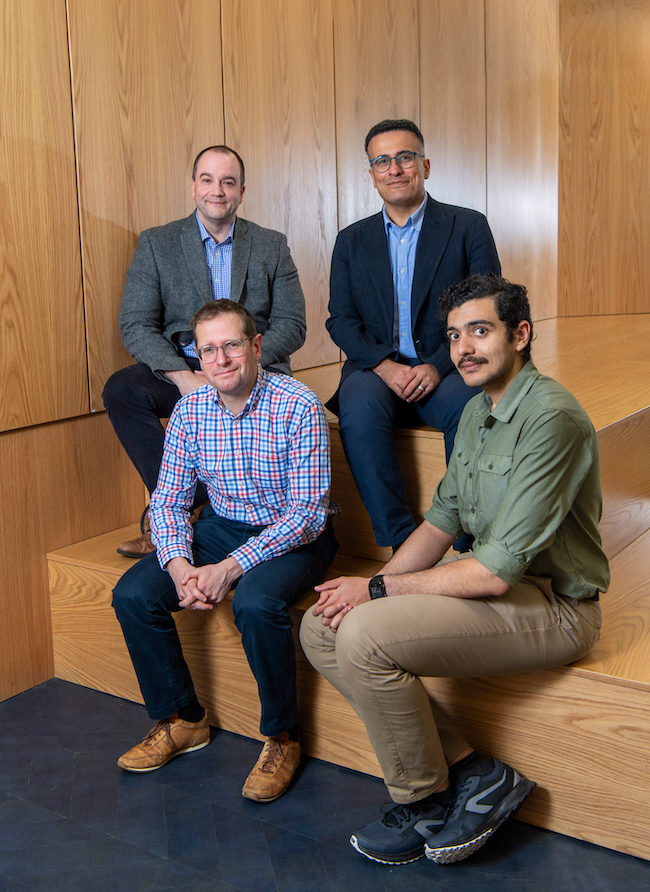£3m grant for new semiconductor chip research facility
Published: 13 May 2024
A major new grant will allow the University of Glasgow to build one of the UK’s most advanced research facilities for silicon chip integration and packaging.
A major new grant will allow the University of Glasgow to build one of the UK’s most advanced research facilities for silicon chip integration and packaging.
The Engineering and Physical Sciences Research Council’s Strategic Equipment Grant scheme will provide £3m to help the University establish ANALOGUE – the Automated Nano AnaLysing, characterisatiOn and additive packaGing sUitE.

Clockwise from top left: Prof David Flynn, Prof Hadi Heidari, Dr Mahmoud Wagih and Prof Jeff Kettle of the James Watt School of Engineering
ANALOGUE will enable the rapid prototyping and characterisation of a wide range of semiconductor devices. New developments prototyped at ANALOGUE could find applications in biomedical implants, sustainable and biodegradable sensors, and quantum computing interfaces.
The facility, which will be based at the University’s Mazumdar-Shaw Advanced Research Centre (ARC), brings together researchers from the University’s James Watt School of Engineering with a strategic network of partners from industry, national semiconductor facilities, and academia, aligned with fast tracking disruptive new technologies into applications.
It aims to support the UK government’s semiconductor strategy by providing access to new technologies to boost cutting-edge research and development. It will also play a role in expanding the country’s semiconductor skills base through industry-led events and partnerships with Centres for Doctoral Training across the UK.
The suite will house chip probing equipment, advanced packaging capabilities, and additive electronics manufacturing using state-of-the-art tools.
The equipment will be automated as a single suite, making it the UK’s first machine-driven integrated assembly and characterisation line for semiconductor devices. ANALOGUE’s advanced automation will allow users to use the suite remotely, with support from on-site experts, helping to streamline the research process.
ANALOGUE will also provide support for ongoing efforts to decarbonise the electronics supply chain by helping researchers gather data on their product’s environmental impact.
ANALOGUE will be open to academia and industry working on low-volume and high-value research and development projects, helping them to rapidly prototype advanced nanoelectronic devices.
Professor Hadi Heidari, Head of the University of Glasgow’s Electronics and Nanoscale Engineering Research Division, is the project’s principal investigator.
He said: “This grant is a significant milestone for semiconductor research in the UK, which is a key part of the country’s economy. The electronics sector as a whole supports more than a million jobs in the country, and the UK government has ambitious plans to grow the sector in the years to come.
“The establishment of ANALOGUE represents a substantial advance in the UK’s semiconductor research infrastructure for heterogeneous integration and advanced packaging.
“This initiative will help spark new innovations across the tech sector and cultivate valuable partnerships between academia and industry, helping to support breakthrough research which can drive economic expansion."
The suite is supported by 27 external project partners including national facilities such as the Manufacturing Technology Centre (MTC) and the National Physical Laboratory (NPL), academic networks (EPSRC eFutures and E-Textiles), and top research universities.
A team of 23 academics and more than 100 researchers and students will make regular use of the facility. ANALOGUE’s industrial partners include Arm, PragmatIC, Inseto, Nano-Dimension, Vector Photonics, Touchlab, Printed Electronics, Kelvin Nanotechnology, Denchi Power, SeeQC, Quantum Science, Labman, Scotland 5G Centre, and CENSIS.
This multidisciplinary project is strongly supported by other colleagues at the James Watt School of Engineering from different areas of Quantum Technologies, Medical Implantables, Wearables and Diagnostics, Ultrasound Systems, and Sustainable Electronics including Prof Jeff Kettle, Prof David Flynn, Dr Mahmoud Wagih, Prof Martin Weides, Prof Muhammad Imran, Prof Edward Wasige, Prof Marc Sorel, Dr Chong Ii, Dr Kaveh Delfanazari, Dr Andrew Feeney, Prof Sandy Cochran, Dr John Mercer, Dr Daniel Mulvihill, Prof Margaret Lucas, Prof S Kumar, Prof David Cumming, Prof Manuel Salmeron-Sanchez, Prof Qammer Abbasi, Dr Morteza Amjadi, Prof Julien Reboud, Prof Jonathan Cooper, Dr Qingshen Jing, Dr Kwok Ho Lam and Dr Rair Macedo.
First published: 13 May 2024
<< May

